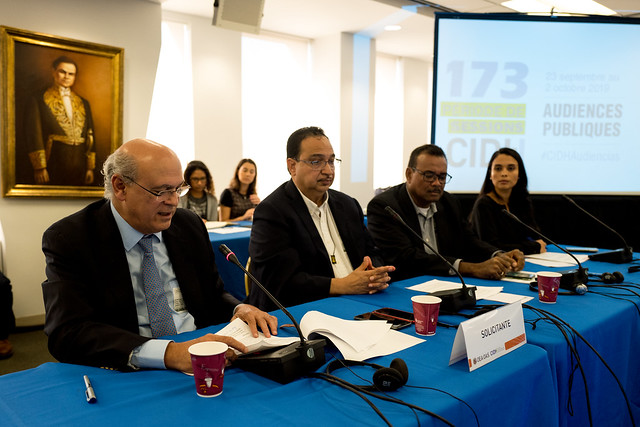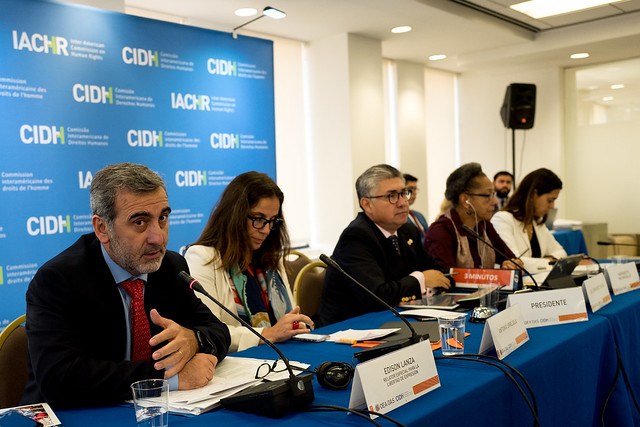At a public hearing before the Inter-American Commission on Human Rights (IACHR), journalists from Nicaragua denounced that the precautionary measures granted by that entity have not been complied with by the Nicaraguan State, a situation that places them at further risk. Representatives of the Nicaraguan State did not appear at the hearing.
Sergio León Corea, general director of radio La Costeñísima; Aníbal Toruño, owner and director of Radio Darío; Carlos Fernando Chamorro, director of the Confidencial and Esta Semana; together with Ana Bolaño, from the Institute of Race, Equality and Human Rights, made their presentation at the hearing entitled “Compliance with precautionary protection measures in favor of independent journalists in Nicaragua” on Sept. 25.
Bolaño began by lamenting the absence of the State that in her opinion “demonstrates the lack of will to be accountable to international authorities.” She said that more than a year after the start of popular protests against the government of Daniel Ortega, “the violence and attacks against independent journalists and media [...] has not ceased.”

Carlos Chamorro, Aníbal Toruño, Sergio León, and Ana Bolaño during the hearing at the IACHR. (Photo: IACHR).
“The Nicaraguan government continues to illegitimately restrict the rights to freedom of expression, the right to inform as well as the freedom of association and assembly, essential rights for the effective functioning of all democratic society,” Bolaño said. “Independent journalists and media continue to be exposed to harassment, persecution and a series of threats and reprisals for their work; which puts them in the face of an imminent risk of violation of their freedom, their lives and personal integrity.”
Recognizing this danger, as Bolaño said, the IACHR has granted precautionary measures to different journalists, their families, as well as to media workers with the purpose of “protecting their lives, their physical integrity and their freedom of expression.”
However, the precautionary measures have not been complied with by the State of Nicaragua, Bolaño said, and instead it has carried out “actions and omissions [...] in order to censor the critical discourse about the repression that began in April of 2018.”
Léon said that despite the precautionary measures granted on June 15, “police and armed civilians acting as parastatals continue to threaten and besiege me, seeking to silence my voice the voices that are expressed on Radio La Costeñísima.”
According to León, the siege against the few independent media spaces on the Caribbean coast of the country is constant, “it is even forbidden to tune into the station in public institutions.” He said that at the community level there is a strategy to affect the station since there are people who “monitor” what their neighbors listen to. “[The people] are forced to listen at a low volume so that they do not identify them and retaliate against them,” he said.
The radio director said that “many drivers of opinion have refrained from giving statements” so as not to suffer the consequences. He also denounced that the headquarters of the radio station as well as his house are still being monitored, and that recently his website was attacked when more than 36,000 people tried to enter it.
In the case of Radio Darío, the fight for freedom of expression has lasted for 70 years. According to its director and owner, Aníbal Toruño, it has been “destroyed by Somoza and Daniel Ortega six times” during this period.
However, it was the attacks that occurred since April 2018, which led him to leave the country for fear of his life. One of the most serious was when on April 20, 2018 “a command of 13 paramilitaries” set the station on fire with Toruño and 9 other workers inside. All people managed to get out alive.
Due to that attack and other prior incidents, on July 2, 2018 the IACHR granted precautionary measures in favor of Toruño and 13 other persons linked to Radio Darío. However, as in other cases, Toruño denounced that the State “still has not adopted the necessary measures to guarantee the life and personal integrity of the beneficiaries so that they can carry out their journalistic work without being subjected to intimidation, threats or other acts of violence.”
He said that no investigations have been opened to capture those responsible for the fire and the other attacks against Radio Darío "that resulted in the precautionary measures." On the contrary, the radio station and its workers have continued to be “subject to sieges, raids and detentions by the police,” the journalist said at the hearing.
Toruño said that after his return to the country he could see with “evidence” how the government and parastatal actors are behind the attacks against the radio, and that the “State has orchestrated a stage of selective attacks against independent voices and media directors among them Radio Darío, its team and my person.”
“I found a regime that continues to pursue independent media and journalists," Toruño said.
Unlike Toruño, Carlos Fernando Chamorro, director of Confidencial and Esta Semana, remains in exile. Chamorro decided to leave with his wife after the national police raided and "looted" the newsroom of the media outlets he directs on Dec. 13, 2018 "without any court order." The next day, the police returned to occupy the place, and are still there today.
On Dec. 21, the IACHR granted precautionary measures to Chamorro, his wife and 13 other members of Confidencial, but as with the other cases, the government has not complied with these and “on the contrary they have maintained and worsened the aggressions,” Chamorro reported.
That same day, the government raided the media outlet 100% Noticias and arrested journalists Miguel Mora and Lucía Pineda - a situation that alerted Chamorro as to what could happen to him. “On January 2, 2019, I was forced to go into exile in Costa Rica along with my wife to protect my freedom and my physical integrity, and to be able to continue practicing journalism in freedom,” Chamorro said.
Other eight members of Confidencial also sought asylum in different countries such as Costa Rica, El Salvador, Mexico and the United States. Other people stayed in Nicaragua, "in a state of helplessness under siege and threats that regime operators maintain directly in their homes and on social networks," Chamorro said, adding that they will request additional precautionary measures for other journalists.

Through Chamorro, the beneficiaries of the precautionary measures made a series of requests to the IACHR. One of them is that in view of the non-compliance of the State, the IACHR requests provisional measures from the Inter-American Court of Human Rights for all persons under precautionary measures.
They also asked the Commission to resubmit a demand to Nicaragua to cease its repression against media and journalists, and to return stolen property. And to continue the investigation of the situation in the country.
Commissioner Joel Hernández García said at the beginning of the hearing that the IACHR had just received a note from the State with arguments on the issue discussed during the hearing. The Commissioner indicated that this would be added to the file, but he regretted that the State representative had not been there to respond personally.
“It is a missed opportunity for the representatives of the State and it is certainly a breach of its obligations before the Commission,” Hernández said.
Commissioner Antonia Urrejola, rapporteur for Nicaragua, said that the request for provisional measures before the Inter-American Court would be considered in the Commission’s plenary, but did not give a date.